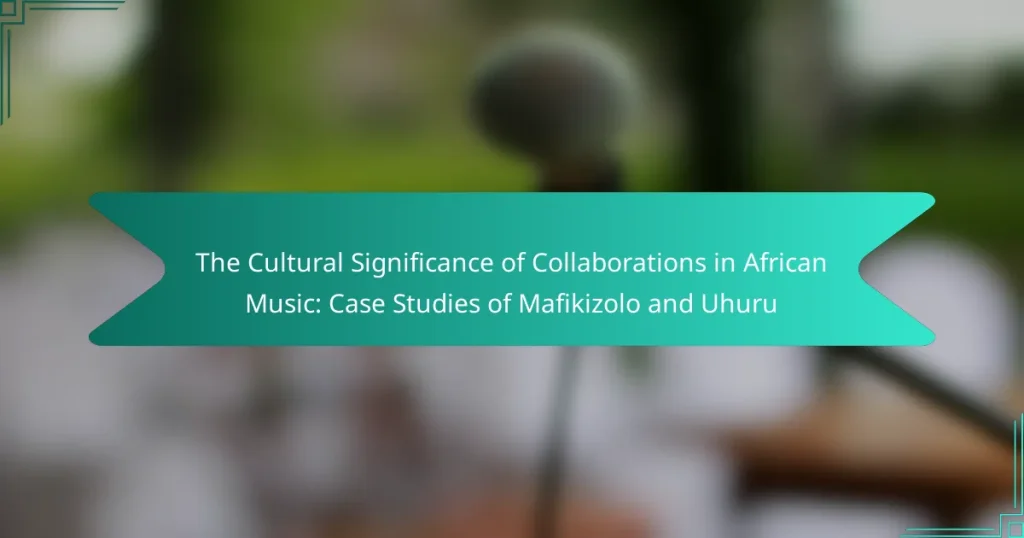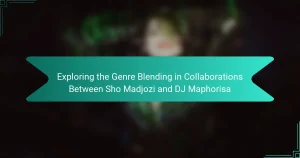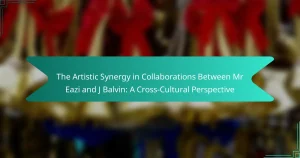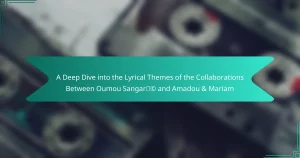Collaborations in African music play a crucial role in promoting cultural unity and creativity by blending diverse musical traditions. This article examines the significance of such partnerships, focusing on the influential South African group Mafikizolo and the music collective Uhuru. Through case studies of their notable collaborations, including hits like “Khona” and “African Queen,” the article highlights how these collaborations foster cross-cultural exchange and address social issues. Additionally, it emphasizes the integration of traditional elements with contemporary styles, showcasing the rich heritage and innovative spirit of African music.
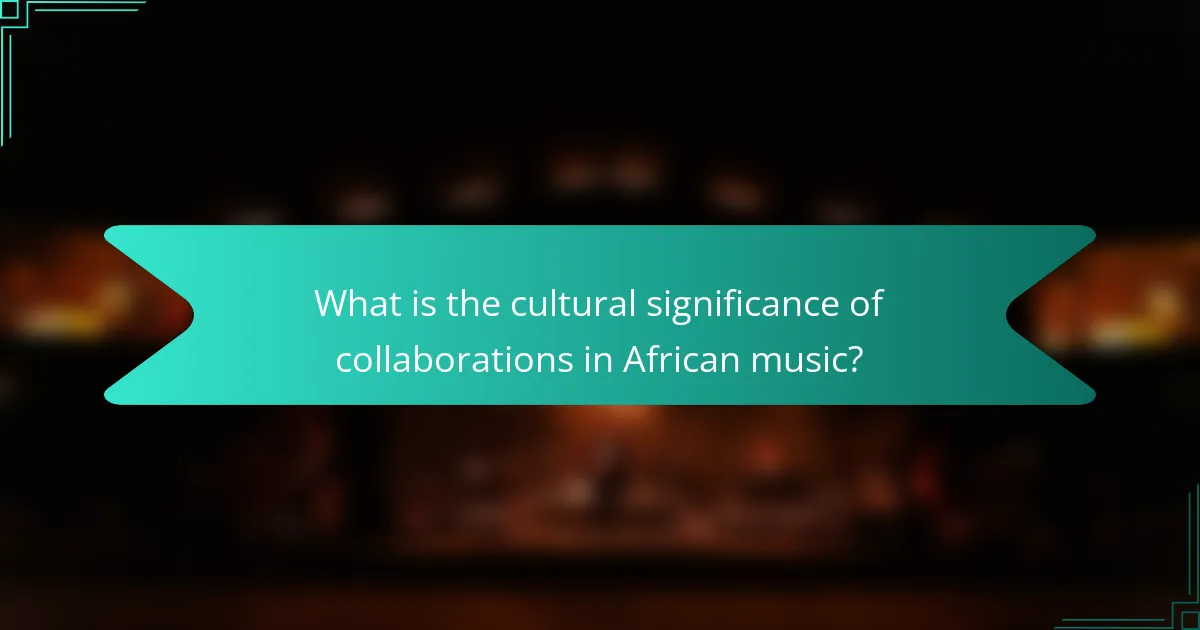
What is the cultural significance of collaborations in African music?
Collaborations in African music hold significant cultural importance as they foster unity and creativity among diverse musical traditions. They serve as a platform for artists to blend different genres, promoting cross-cultural exchange. This blending often results in innovative sounds that resonate with wider audiences. Collaborations also highlight the rich heritage of African music by integrating traditional elements with contemporary styles. For instance, the partnership between Mafikizolo and Uhuru showcases how traditional Afro-pop can merge with modern house music, creating a unique listening experience. Furthermore, such collaborations often address social issues, using music as a medium for advocacy and awareness. Overall, these partnerships not only enhance artistic expression but also strengthen community ties and cultural identity across the continent.
How do collaborations influence the music landscape in Africa?
Collaborations significantly influence the music landscape in Africa by fostering cultural exchange and innovation. They allow artists to blend diverse musical styles and genres. This blending creates unique sounds that resonate with wider audiences. For instance, collaborations between Afrobeat and hip-hop artists have gained global recognition. These partnerships often lead to increased visibility for local artists. They also promote cross-border connections among different African nations. The success of groups like Mafikizolo showcases how collaborations can enhance popularity and reach. Research indicates that such joint efforts contribute to the growth of the African music industry. Overall, collaborations serve as a catalyst for artistic evolution and cultural dialogue in Africa.
What are the historical roots of musical collaborations in Africa?
Musical collaborations in Africa have deep historical roots that date back centuries. Traditional African music often involved communal participation and collective performance. This practice fostered collaborations among musicians, dancers, and community members. During the pre-colonial era, music served as a medium for storytelling and cultural expression. It facilitated social cohesion and unity within tribes and communities. The arrival of colonial influences introduced new musical genres, which further encouraged cross-cultural collaborations. Post-independence, African musicians began to blend traditional sounds with global influences. This evolution paved the way for contemporary collaborations, exemplified by groups like Mafikizolo and Uhuru. These collaborations reflect a rich tapestry of cultural exchange and shared musical heritage.
How do collaborations reflect cultural diversity in African music?
Collaborations in African music reflect cultural diversity by blending various musical styles and traditions. These partnerships often unite artists from different ethnic backgrounds, showcasing unique sounds. For instance, Mafikizolo combines traditional African rhythms with contemporary pop elements. Similarly, Uhuru incorporates diverse genres like house and kwaito in their music. Such collaborations promote cross-cultural exchange and understanding. They also highlight the rich tapestry of languages and dialects within African cultures. The fusion of different musical influences creates innovative sounds that resonate with broader audiences. Overall, these collaborations serve as a celebration of Africa’s cultural richness and diversity.
Why are Mafikizolo and Uhuru important case studies?
Mafikizolo and Uhuru are important case studies due to their significant impact on African music collaboration. Mafikizolo, a renowned South African duo, blends traditional sounds with contemporary genres. Their music showcases the fusion of cultural elements, appealing to diverse audiences. Uhuru, a prominent group, is known for their innovative incorporation of house music styles. Their collaboration with Mafikizolo resulted in hits that resonated across the continent. This partnership exemplifies how collaborations can enhance cultural exchange and musical evolution in Africa. Their work highlights the importance of unity in the music industry, promoting shared experiences and cultural pride.
What unique attributes do Mafikizolo bring to African music collaborations?
Mafikizolo brings a unique blend of traditional African sounds and contemporary genres to music collaborations. Their fusion of Afro-pop with elements of kwaito and house music creates a distinctive sound. This versatility allows them to appeal to diverse audiences across the continent. Their rich vocal harmonies enhance the emotional depth of their collaborations. Mafikizolo’s use of indigenous languages in their lyrics promotes cultural authenticity. They have collaborated with various artists, showcasing their adaptability and respect for different musical styles. Their energetic performances create a vibrant atmosphere, enhancing the collaborative experience. This unique combination solidifies their status as influential figures in African music collaborations.
How has Uhuru shaped the contemporary African music scene?
Uhuru has significantly influenced the contemporary African music scene through their innovative sound and collaborations. The group is known for blending genres such as house, Afro-pop, and kwaito, creating a unique musical style. Their hit singles, like “Y-tjukutja” and “Khona,” topped charts across Africa, showcasing their widespread appeal. Uhuru’s collaborations with artists like Mafikizolo have further popularized their music. These partnerships have brought diverse sounds to mainstream audiences. Their impact is evident in the rise of dance music in African pop culture. Uhuru has also played a role in promoting African music on global platforms. Their success has inspired a new generation of artists to explore cross-genre collaborations.

What are the key collaborations of Mafikizolo?
Mafikizolo has collaborated with several prominent artists. Their notable collaborations include “Khona” with Uhuru, which gained massive popularity. They also worked with Nigerian artist Wizkid on the track “African Queen.” Additionally, they collaborated with DJ Maphorisa on the hit “Particula.” Another significant collaboration was with the artist Yemi Alade on “Taka Suka.” These partnerships showcase Mafikizolo’s influence and reach in the African music scene. Their collaborations often blend various musical styles, enhancing their cultural significance.
How have Mafikizolo’s collaborations impacted their musical style?
Mafikizolo’s collaborations have significantly enriched their musical style by incorporating diverse influences. Collaborations with various artists have introduced elements of Afro-pop, kwaito, and house music into their sound. This blending of genres has allowed them to reach a broader audience. Notably, their partnership with Uhuru on the hit “Khona” showcased a fusion of traditional African rhythms with contemporary beats. This track became a commercial success, further solidifying their place in the music industry. Additionally, collaborations with international artists have expanded their musical palette. These partnerships have enhanced their lyrical themes and production techniques. Overall, collaborations have played a crucial role in evolving Mafikizolo’s sound and appeal.
What notable artists have collaborated with Mafikizolo?
Mafikizolo has collaborated with several notable artists, enhancing their musical impact. Collaborations include working with artists like Uhuru, who contributed to the hit song “Khona.” They also partnered with Nigerian artist Wizkid on the track “African Queen.” Additionally, Mafikizolo has collaborated with other prominent figures such as Toshi and DJ Maphorisa. These partnerships showcase their influence in the African music scene. Each collaboration has brought unique elements to their sound, demonstrating the power of musical synergy in African culture.
In what ways have these collaborations enhanced their cultural significance?
Collaborations between Mafikizolo and Uhuru have enhanced their cultural significance by merging diverse musical styles. This fusion creates a richer auditory experience that resonates with broader audiences. The collaborations also promote cross-cultural dialogue, bridging different African musical traditions. Such interactions foster a sense of unity among various ethnic groups. Additionally, the partnerships elevate traditional sounds by incorporating contemporary elements. This blend appeals to younger generations, ensuring the preservation of cultural heritage. The success of their collaborations is evident in chart-topping hits that celebrate African identity. These achievements highlight the importance of collaboration in promoting cultural diversity and innovation.
What themes are prevalent in Mafikizolo’s collaborative works?
Mafikizolo’s collaborative works often explore themes of love, unity, and cultural pride. Their music frequently emphasizes the importance of togetherness in relationships. The duo also highlights African heritage through their lyrics and melodies. Collaborations often feature diverse musical styles, showcasing cultural fusion. This blending of genres enriches the listening experience. Additionally, their songs reflect social issues and community empowerment. The collaborations aim to inspire and uplift audiences. Overall, these themes contribute to their significant impact on African music.
How do these themes resonate with African audiences?
Themes of collaboration in African music resonate deeply with African audiences. They reflect shared cultural values and collective identity. Collaborations often blend diverse musical styles, appealing to a wide range of listeners. For example, Mafikizolo’s fusion of Afro-pop and traditional sounds engages both younger and older generations. Uhuru’s collaborations with various artists showcase unity and diversity within the continent. This approach fosters a sense of belonging among listeners. Additionally, themes of love, community, and celebration in these collaborations mirror everyday experiences in African societies. Such relevance enhances emotional connections with the music, making it more impactful.
What messages do their collaborations convey about African identity?
Collaborations between Mafikizolo and Uhuru convey messages of unity and cultural pride in African identity. Their music often blends traditional African sounds with contemporary genres. This fusion highlights the richness and diversity of African culture. The lyrics frequently celebrate African heritage and communal values. Their collaborations also emphasize resilience and hope amidst challenges faced by African communities. By showcasing local languages and rhythms, they promote cultural authenticity. This approach fosters a sense of belonging and collective identity among listeners. Overall, their work reinforces the importance of cultural expression in defining African identity.
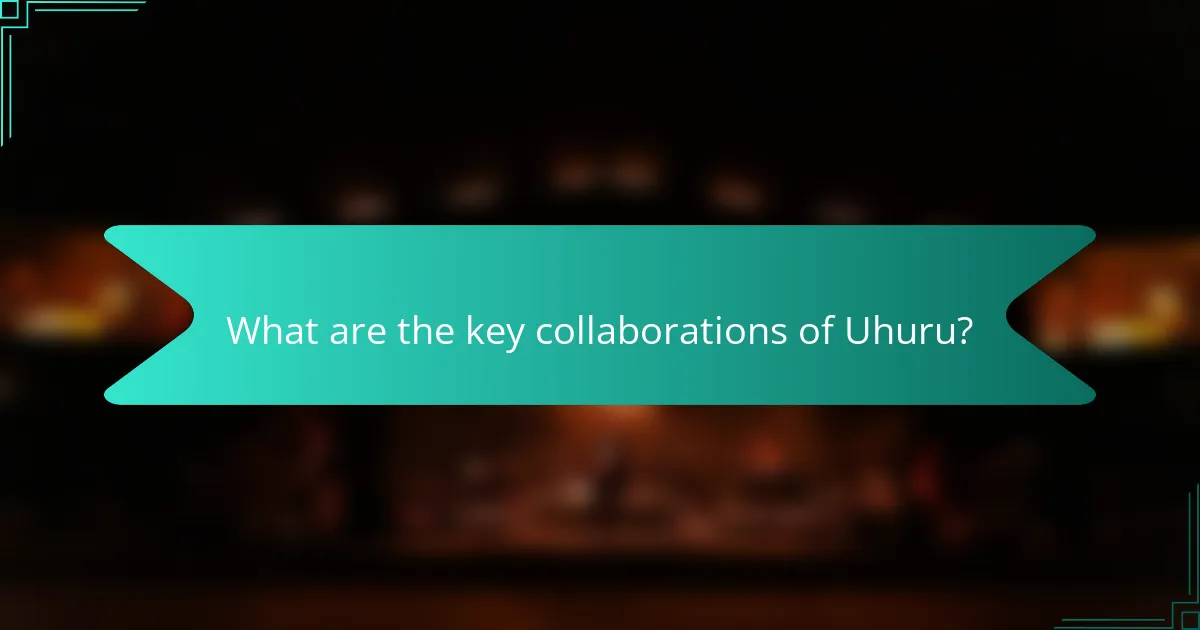
What are the key collaborations of Uhuru?
Uhuru’s key collaborations include notable partnerships with various artists. They collaborated with Mafikizolo on the hit song “Khona.” This track gained significant popularity across Africa. Uhuru also worked with DJ Buckz on “Y-Tjukutja,” which further showcased their musical versatility. Additionally, they partnered with the producer DJ Maphorisa on multiple tracks. These collaborations contributed to their success in the South African music scene. Each collaboration highlighted Uhuru’s ability to blend different musical styles. Their work with established artists helped to elevate their profile in the industry.
How have Uhuru’s collaborations shaped their musical identity?
Uhuru’s collaborations have significantly shaped their musical identity by blending various genres and influences. They have worked with artists across different styles, including house, pop, and traditional African music. This fusion has allowed them to create a unique sound that resonates with diverse audiences. Collaborations with well-known artists, such as DJ Zinhle and Professor, have expanded their reach and visibility in the music industry. Their partnership with international artists has also introduced global elements into their music. This cross-pollination of styles enhances their appeal and showcases their versatility. Overall, these collaborations have contributed to Uhuru’s reputation as a leading force in contemporary African music.
What are the standout tracks resulting from Uhuru’s collaborations?
Standout tracks resulting from Uhuru’s collaborations include “Y-Tjukutja,” featuring Professor. This track became a major hit in South Africa. Another notable collaboration is “Khona,” with Mafikizolo, which topped charts and gained international recognition. “Taki Taki,” featuring DJ Buckz, showcases Uhuru’s unique sound and has received significant airplay. Additionally, “Soweto” with DJ Sbu highlights Uhuru’s influence in the genre. These tracks exemplify Uhuru’s ability to blend different musical styles. Their collaborations often result in chart-topping singles that resonate with a wide audience.
How do these collaborations reflect societal issues in Africa?
Collaborations in African music, such as those between Mafikizolo and Uhuru, reflect societal issues by addressing themes like unity, poverty, and cultural identity. These partnerships often highlight the struggles faced by communities, including economic disparities and social injustices. For instance, their lyrics frequently touch on the challenges of everyday life in Africa. This resonates with audiences who experience similar hardships. Additionally, these collaborations promote cultural pride and heritage. They showcase the richness of African music while fostering a sense of belonging. Overall, such artistic collaborations serve as a mirror to the societal landscape, revealing both challenges and resilience within African communities.
What cultural themes emerge from Uhuru’s collaborative efforts?
Uhuru’s collaborative efforts reveal themes of unity, cultural identity, and innovation. The group often collaborates with various artists, blending different musical styles. This fusion creates a rich tapestry of sounds that reflects African heritage. Their work emphasizes the importance of community and shared experiences. Collaborations often highlight traditional African rhythms alongside contemporary genres. This approach fosters a sense of belonging among listeners. Additionally, Uhuru’s music addresses social issues, promoting messages of hope and resilience. Their collaborations serve as a platform for diverse voices within the African music scene.
How do these themes connect with the experiences of African youth?
The themes of collaboration in African music resonate deeply with the experiences of African youth. Collaborations like those of Mafikizolo and Uhuru reflect shared cultural identities. They foster a sense of community and belonging among young people. These collaborations often address social issues relevant to youth, such as love, struggle, and aspiration. For instance, Mafikizolo’s music often highlights themes of resilience and hope. This encourages youth to engage with their cultural heritage. Furthermore, collaborations showcase diverse musical styles, appealing to a broad audience. This diversity allows youth to express their individuality while connecting with their roots. Overall, these themes reinforce the importance of unity and cultural pride among African youth.
What role do Uhuru’s collaborations play in promoting African unity?
Uhuru’s collaborations serve as a vital platform for promoting African unity. These partnerships blend diverse musical styles and cultural influences from various African nations. By collaborating with artists from different regions, Uhuru fosters cross-cultural dialogue and understanding. Their music often addresses shared themes such as love, resilience, and social issues relevant to the continent. This approach helps to bridge cultural divides and create a sense of collective identity among listeners. Furthermore, their collaborations often result in chart-topping hits that resonate widely across Africa. This widespread appeal enhances the visibility of African music on global stages. Thus, Uhuru’s collaborations contribute significantly to the ongoing narrative of unity and collaboration within the African continent.
What practical insights can be drawn from the collaborations of Mafikizolo and Uhuru?
The collaborations of Mafikizolo and Uhuru highlight the power of blending musical styles. Their joint efforts showcase the fusion of Afro-pop and house music. This approach broadens their audience reach significantly. The partnership emphasizes the importance of collaboration in enhancing creativity. It also demonstrates how cultural exchange can lead to innovative sounds. The successful tracks produced have garnered millions of views on platforms like YouTube. This indicates a strong market demand for such collaborations. Overall, their work exemplifies the impact of teamwork in the African music industry.
How can emerging artists leverage collaborations for cultural impact?
Emerging artists can leverage collaborations for cultural impact by combining diverse creative perspectives. Collaborations allow artists to reach wider audiences through shared fan bases. They can enhance their artistic expression by integrating different musical styles and cultural influences. This fusion can lead to innovative sounds that resonate with various communities.
For instance, Mafikizolo’s collaboration with Uhuru resulted in the hit song “Khona,” which gained international acclaim. The partnership showcased the blending of Afro-pop and electronic music, appealing to both local and global listeners. Such collaborations can also foster cultural exchange, promoting understanding and appreciation of different backgrounds.
Moreover, partnerships can amplify social messages, as seen in projects addressing social issues. By working together, emerging artists can create a stronger cultural narrative that reflects contemporary experiences. This strategy not only elevates their profiles but also contributes to the evolution of their music genres.
What best practices can be adopted from Mafikizolo and Uhuru’s approaches to collaborations?
Mafikizolo and Uhuru exemplify effective collaboration practices in African music. They prioritize blending diverse musical styles to create unique sounds. This approach enhances their appeal across various audiences. Both groups leverage their individual strengths to complement each other. They engage in strategic marketing to maximize reach and impact. Additionally, they maintain open communication throughout their collaborative processes. This fosters creativity and innovation in their projects. Their collaborations often involve cultural storytelling, enriching the narrative depth of their music. This practice resonates deeply with fans, creating lasting connections.
The primary entity of this article is the cultural significance of collaborations in African music, with a focus on the case studies of Mafikizolo and Uhuru. The article explores how these collaborations foster unity, creativity, and cultural exchange among diverse musical traditions, highlighting their historical roots and contemporary relevance. It discusses the impact of these partnerships on the music landscape, the unique attributes of the artists involved, and the prevalent themes in their works, such as love, unity, and cultural pride. Additionally, it examines how these collaborations reflect societal issues and promote African identity, offering practical insights for emerging artists to leverage collaborative efforts for cultural impact.
